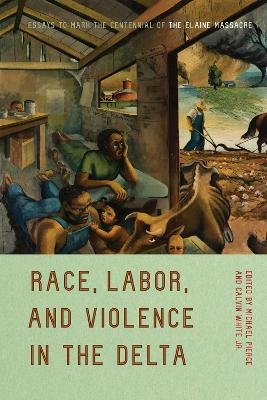
Race, Labor, and Violence in the Delta
University of Arkansas Press (Verlag)
978-1-68226-205-4 (ISBN)
Race, Labor, and Violence in the Delta examines the history of labor relations and racial conflict in the Mississippi Valley from the Civil War into the late twentieth century. This essay collection grew out of a conference marking the hundredth anniversary of one of the nation’s deadliest labor conflicts—the 1919 Elaine Massacre, during which white mobs ruthlessly slaughtered over two hundred African Americans across Phillips County, Arkansas, in response to a meeting of unionized Black sharecroppers. The essays here demonstrate that the brutality that unfolded in Phillips County was characteristic of the culture of race- and labor-based violence that prevailed in the century after the Civil War. They detail how Delta landowners began seeking cheap labor as soon as the slave system ended—securing a workforce by inflicting racial terror, eroding the Reconstruction Amendments in the courts, and obstructing federal financial-relief efforts. The result was a system of peonage that continued to exploit Blacks and poor whites for their labor, sometimes fatally. In response, laborers devised their own methods for sustaining themselves and their communities: forming unions, calling strikes, relocating, and occasionally operating outside the law. By shedding light on the broader context of the Elaine Massacre, Race, Labor, and Violence in the Delta reveals that the fight against white supremacy in the Delta was necessarily a fight for better working conditions, fair labor practices, and economic justice.
Michael Pierce is associate professor of history at the University of Arkansas, Fayetteville. He is the author of Striking with the Ballot: Ohio Labor and the Populist Party. Calvin White Jr. is associate dean of the Fulbright College of Arts and Sciences at the University of Arkansas, where he is also associate professor of history. He is the author of The Rise to Respectability: Race, Religion, and the Church of God in Christ.
Acknowledgments — Introduction
Chapter 1; Black Agricultural Labor Activism and White Oppression in the Arkansas Delta: The Cotton Pickers’ Strike of 1891 — Matthew Hild
Chapter 2; “Night Riding Must Not Be Tolerated in Arkansas”: One State’s Uneven War against Economic Vigilantism — Guy Lancaster
Chapter 3; Black Workers, White Nightriders, and the Supreme Court’s Changing View of the Thirteenth Amendment — William H. Pruden III
Chapter 4; Henry Lowery Lynching: A Legacy of the Elaine Massacre? — Jeannie Whayne
Chapter 5; Black Women, Violence, and Criminality in Post–World War I Arkansas, 1919–1922 — Cherisse Jones-Branch
Chapter 6; Steadily Holding Our Heads above Water: The Flood of 1927, White Violence, and Black Resistance to Labor — Exploitation in the Mississippi Delta — Michael Vinson Williams
Chapter 7; “Boss Man Tell Us to Get North”: Mexican Labor and Black Migration in Lincoln County, Arkansas, 1948–1955 — Michael Pierce
Chapter 8; Sweet Willie Wine’s 1969 Walk against Fear: Black Activism and White Response in East Arkansas Fifty Years after the Elaine Massacre — John A. Kirk
Chapter 9; “Sick and Sinister”: Intersections of Violence and the Struggle for Economic Justice in the Late Twentieth Century — Greta de Jong
Epilogue; Evil in the Delta — Michael HoneyNotes — Contributors — Index
| Erscheinungsdatum | 31.05.2022 |
|---|---|
| Verlagsort | Fayetteville |
| Sprache | englisch |
| Maße | 152 x 229 mm |
| Gewicht | 363 g |
| Themenwelt | Geisteswissenschaften ► Geschichte ► Allgemeine Geschichte |
| Geisteswissenschaften ► Geschichte ► Regional- / Ländergeschichte | |
| Sozialwissenschaften ► Ethnologie | |
| Sozialwissenschaften ► Soziologie | |
| ISBN-10 | 1-68226-205-7 / 1682262057 |
| ISBN-13 | 978-1-68226-205-4 / 9781682262054 |
| Zustand | Neuware |
| Haben Sie eine Frage zum Produkt? |
aus dem Bereich


